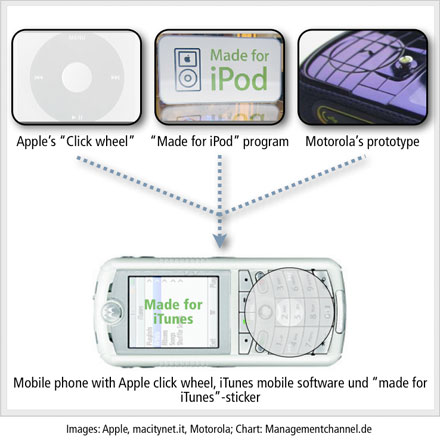Apple’s next big thing – click wheel technology everywhere
This is a translation of *this* German article. Thanks to Google and LEO for assistance. As we are not English native speakers we would like to apologize for misspellings and creative use of grammar.
As the disappointment about the design of the “ROKR” abates, the question remains, in which direction Apple’s strategy for mobile phones is heading.
Steve Jobs, CEO von Apple, describes Apple’s commitment reservedly:
“We see it as something we can learn from. It was a way to put our toe in the water, and learn something”.
Since Jobs never omits an opportunity to praise Apple’s achievements to the skies using his famous reality distortion field, this statement should alert us! What does he want to hide from us?
Apple fans and analysts seem to agree: an aesthetically designed, user friendly mobile telephone developed by Apple would fly off the shelves. It seems only a question of time, until Apple brings one to market.
But maybe they didn’t take into account Steve Jobs’ frame of mind. The idea of an iPhone by Apple seems so natural by now, that it is simply not spectacular enough for a manager who lusts after no less than changing the world.
Moreover Apple will consider cautiously, whether it should enter a market
- where competition is fierce and the pressure on margins is extremely high,
- where the mobile carriers are so powerful, that their goodwill would have a great impact for the sales figures of an Apple iPhone, and
- where even Microsoft struggles to penetrate the market with a mobile version of its Windows operating system.
Then again should Apple neglect a market
- that represents a massive threat to the iPod product line, because consumers could substitute iPods with mobile phones,
- that has a healthy annual demand for over 700 million phones, likely crossing the one billion mark soon and
- where millions of new iTunes Music Store customers could be attracted?
What will Apple do? The answer – presentend in good old Cringely style ( i.e. surprising, convincing, fictitious) – is: Apple is becoming a major supplier for the mobile phone industry, supplying click wheel technology bundled with iTunes mobile software and a soon ubiquitous “iTunes inside” sticker.
Three recent events point at this strategic development trend:
- Apple is abandoning Synaptics as its supplier of track pad and click wheel technology, in order to improve its cost structure and to protect important know-how. Apple already developed the iPod nano’s click wheel.
- Apple launched a program for iPod accessory makers, in which they can license the right to market their products as “made for iPod”. Since a lot of accessory makers make use of this certification, the associated royalty spending seems to pay off.
- A ROKR prototype was equipped with a kind of click wheel element integrated into the keypad. Motorola’s engineers were apparently thrilled by the idea to enhance the usability of the phone with an iPod-like operating control.

The advantages for Apple of becoming a click wheel supplier instead of building its own iPhone are numerous:
- The competition against the established manufacturers would be avoided,
- the high volume of the mobile phone market would add up to a considerable profit even with small margins on click wheels,
- iTunes and its incorporated Fairplay technology would continue to gain market share,
- the brand awareness of the iTunes brand would constantly increase due to the “made for iTunes”-campaign,
- the mobile phone market would lose its threat, since a cannibalization of the iPod market could be compensated by profits generated in the mobile phone market.
To enter the market this way is accompanied by only small risks:
- The click wheel technology already exists; additional R&D expenses are low or have to be spent anyway for further development of the iPod click wheel.
- The iTunes software already exists; additional R&D expenses are manageable.
- Consumer demand for an iTunes-compatible mobile phone exists; mobile phone makers could benefit from incorporating the click wheel, because this would help differentiate their devices from those of their competitors.
- Competitors with similar operating control technology could be kept in check by bundling Apple’s click wheel with Apple’s superior iTunes software
- Click wheels are already being produced in high volume for the iPod, resulting in a considerable lower price per unit; Apple would be able to compete on price – making the market unattractive for smaller competitors.
- Higher sales figures justify higher R&D spending, which could add up to Apple becoming the technological leader in the market, cementing Apple’s value proposition.
Finally Apple’s involvement as a click wheel supplier would not have to be limited to the mobile phone market. Car radios, stereos, televisions, and all kind of home entertainment devices could be equipped with click wheel technology.
“Millions of people all over the world touching Apple technology every day” – now that’s a vision revolutionary enough to be worth being pursued by a man like Steve Jobs.

